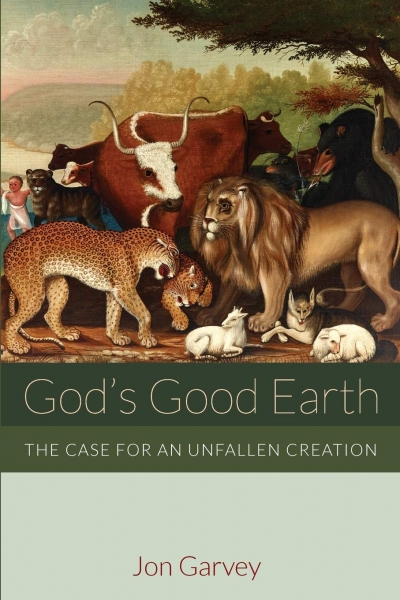This fascinating book aims to change the reader’s thinking on a more ‘traditional’ view and bring it into line with what the author sees as the biblical position. The idea that creation as a whole is fundamentally corrupted because of the fall of mankind has become one of the unquestioned axioms of the Christian faith. But do we really live in a fallen world or just one marred by our disobedience to the Creator? Garvey believes the latter and so makes, in the words of the subtitle, ‘the case for an unfallen creation.’
God’s good earth
Events such as plagues, hurricanes, earthquakes and tsunamis, and the fact that certain animals hunt and eat other animals, usually come under the term ‘natural’ or ‘physical’ evil as they occur in the non-human world. It is often preached, or at least assumed, that these are the inevitable outworking of the cosmic effects of the fall of humanity. This book explores whether this is true and concludes that the traditional view in its entirety lacks any solid biblical support. It even challenges whether these actions should be thought of as evil at all, and explains how these erroneous views emerged. Rather than take them for granted, we need to realise that this is still God’s good earth.
Garvey divides his book into three roughly equal main sections: what the Bible actually says, what theologians have said, and what science contributes to this matter. The final section, ‘The Application’, shows how having the right belief makes a real difference, and what the consequences of this are.
World spoilt by sin
Examining key biblical passages, Garvey demonstrates that God’s judgement upon mankind did not extend to everything he had made. The curse upon the serpent and the ground is very specific and gives no support for a fallen creation as a whole. In fact, creation is as ‘good’ as when it came from the hand of God. It remains in his purpose, is fully obedient to him, and is still capable of praising him and bringing him pleasure. The created world is not in some sinful state, where every insect eaten by a bird or lion stalking its prey is an aberration from God’s will and incurs his wrath.
Creation is as ‘good’ as when it came from the hand of God. It remains in his purpose, is fully obedient to him, and is still capable of praising him and bringing him pleasure.
Nor should we blame ourselves (or Adam) for such things. Certainly we observe a world spoilt by our sinful actions and attitudes. We have made our planet worse when God intended us to make it better. But ‘good’ did not mean that it was once perfect and now is bad. Rather he saw that it was just right for what he had in mind. It was appropriate to God’s intentions, fit for purpose.
Many will think of the passage in Romans 8:19-22, which has often been taught to suggest that ours is a fallen world waiting for its redemption, frustrated and longing for liberation. A careful word study, which the author provides, shows rather that it is frustrated not by any sinful state of its own, but by being the home for sinful humanity. The earth is longing for our redemption so that it is liberated from us as we currently are, and can then become renewed into a home fit for righteous people. Creation goes from being good to better, but not via being bad.
Historical change in worldview
In the section titled, ‘The Theologians’, Garvey shows that for most of Christian history the doctrine of a fallen creation was unknown or at most a minority view. The created order was seen as fundamentally good and unchanged from God’s original purpose. It remained a demonstration of his wisdom, power and goodness, and was a stimulus to praise and worship. A high view of the natural world prevailed.
But this all changed with the Reformers from the sixteenth century onwards. Quoting at length from the writings of Luther, Wesley and Spurgeon, among others, the idea of natural evil makes its first appearance. This theme was then developed greatly, it being claimed that the earth has suffered many hurtful things and creatures now have a whole host of vices due to our sinful state. A very negative attitude came to dominate the evangelical world.
The author explores why this is so. Creation itself hadn’t changed but our worldview had. From the Renaissance onwards a new anthropomorphism emerged which, while still seeking to retain a largely Christian identity, shifted our thinking greatly on matters such as creation. Garvey believes that to assert that the way nature behaves is due to a participation in evil is a serious distortion of what the Bible teaches.
Thankful for creation
The section on science will suit those who want to continue to explore this topic from a scientific standpoint, but others will feel they have read enough by this point. However, the author is keen that his case is accepted by those with many different views on the origins of our world, from young earth creationists to long term evolutionists.
Do we shudder at the thought of a fallen world or embrace it with joy and thanksgiving as God’s good earth?
By the end of the book you many not feel that Garvey’s case is totally proven in all points, but you will certainly be grateful for the opportunity to think things through. His final section, on the consequences of what we believe, is very profound. How do we view creation today? When we look out of the window, go for a walk in the countryside or watch nature programmes on TV, do we shudder at the thought of a fallen world or embrace it with joy and thanksgiving as God’s good earth?
'God’s Good Earth' (229 pages) is published by Cascade Books and is available from The Book Depository





